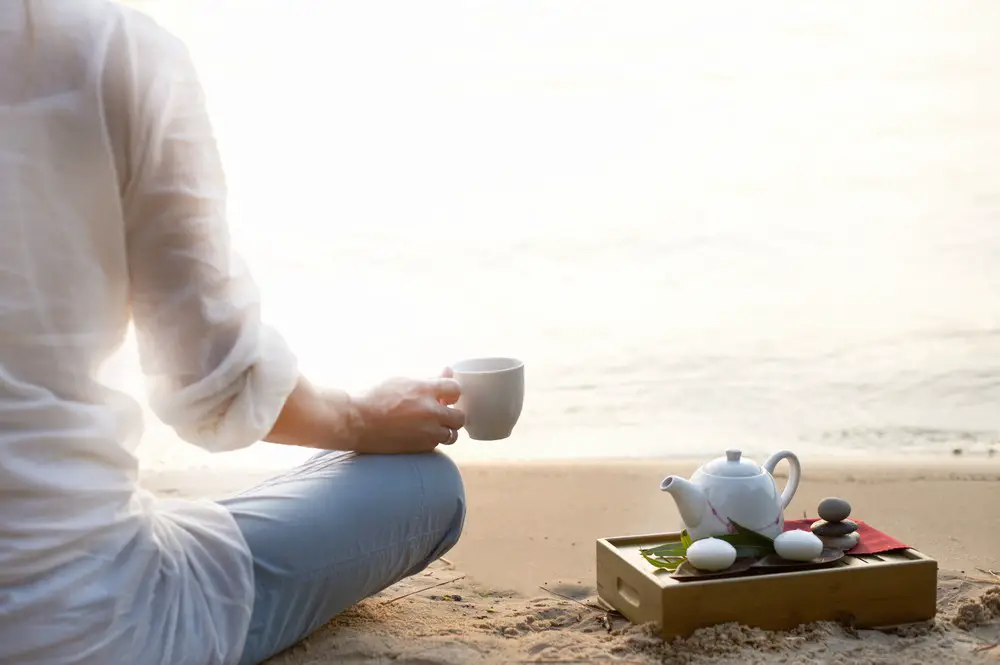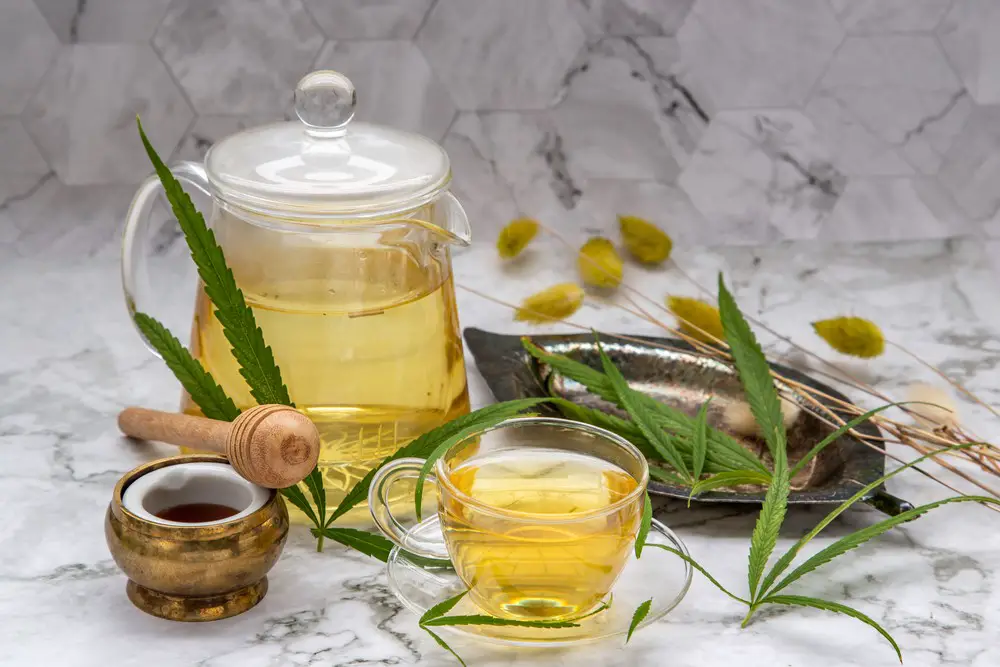As a BetterHelp affiliate, we receive compensation from BetterHelp if you purchase products or services through the links provided
Tea has long been recognized for its ability to calm the mind and foster relaxation, making it an ideal companion for meditation practice. Sipping a freshly brewed cup of tea can enhance their mindfulness, focus, and presence at the moment while enjoying the beverage’s subtle flavors and soothing warmth. This practice of tea meditation has deep roots in several cultural traditions and can be enjoyed by anyone seeking a unique approach to their meditation routine.
One of the most significant connections between tea and meditation is in ancient Chinese and Japanese tea ceremonies. In these ceremonies, preparing and serving tea is infused with intention, gratitude, and respect for each stage, leading participants to mindfulness and tranquility. Tea ceremonies can be adapted to various tea types as a meditative practice, each bringing unique characteristics and benefits to the experience.
With a wide range of flavors, aromas, and mental and physical health benefits, tea offers diverse options for those seeking to incorporate it into their meditation routines. Certain types of tea are particularly well-suited for meditation due to their calming and stress-relieving properties, while others may enhance mental clarity and alertness. The benefits of tea for meditation go beyond the immediate sensory experience, extending into personal growth, emotional well-being, and a greater appreciation for the simple act of enjoying a cup of tea.
Key Takeaways
- Tea is an ideal companion for meditation due to its ability to calm the mind and foster relaxation.
- The practice of tea meditation has deep roots in Chinese and Japanese tea ceremonies.
- Different types of tea offer various mental and physical health benefits that can enhance one’s meditation experience.

The Link Between Tea and Meditation
Tea has been intertwined with meditation practices for centuries. Many people find drinking tea enhances their mindfulness and awareness during meditation, creating a more profound sense of calm and relaxation.
Drinking tea can help prepare the body and mind for meditation. The tea’s warmth and flavors encourage relaxation and facilitate the transition into a meditative state. As one sips their tea, they can focus on their breath, allowing their thoughts to quiet and be fully present in the moment.
Certain teas, such as green tea, contain L-theanine, an amino acid known for its calming properties. L-theanine promotes alpha brain waves, which can help to induce a sense of calm and tranquility, making it easier to slip into a meditative state. Additionally, the natural caffeine in tea offers a gentle energy boost, increasing alertness without causing the jitteriness associated with some other sources of caffeine.
Tea meditation is a practice that combines the ritual of tea preparation and consumption with the principles of mindfulness and awareness. It encourages individuals to be fully present and focused on making and drinking tea. This can involve carefully observing the color and aroma, savoring each sip, and knowing how the tea’s warmth and flavors affect the body and mind.
In summary, tea can serve as a valuable companion for meditation practice. Its calming properties, gentle energy boost, and the ritual of consuming tea all contribute to a deeper experience of mindfulness and awareness. By combining the practices of tea drinking and meditation, one can achieve a more profound sense of inner peace and harmony.
Tea and Meditation Practices in Different Cultures
Tea and meditation have a long, interconnected history in various cultures worldwide. In China, where tea drinking originated more than 4,000 years ago, tea ceremonies have been used to enhance mindfulness and facilitate a deeper connection between the body, mind, and spirit. Monks in China were the first to recognize tea’s potential as a meditation tool.
Moving east to Japan, Zen Buddhists incorporated tea ceremonies into their meditation practices. The Japanese tea ceremony, or chanoyu, has been integral to Japanese culture for centuries. While Chinese and Japanese tea ceremonies share some similarities, the Japanese tea ceremony is more structured and solemn, reflecting the Zen Buddhist values of aesthetic simplicity and the appreciation of transient beauty.
Tea and meditation are not as closely intertwined in India as in China and Japan. However, tea drinking has become a widespread cultural practice, particularly in masala chai and Ayurvedic herbal teas. These teas often contain aromatic spices and herbs believed to have calming and healing properties, making them an ideal companion for meditation sessions.
While tea ceremonies may vary from culture to culture, there is a profound and universal connection between tea and meditation. The actual preparation and consumption of the tea entails mindful attention to the present moment, promoting a sense of focus and calm. Furthermore, the natural psychoactive compounds found in tea leaves, such as L-theanine, have been shown to relax the mind and body, enhancing the benefits of meditation.
Through the evolution of tea ceremonies and consumption worldwide, it is evident that tea has transcended its humble origins as a simple beverage to become a meaningful and integral part of meditation practices in countries like China, Japan, and India. These ancient traditions continue to inspire and influence modern tea culture and meditation techniques, bridging the cultural divide and uniting people in a shared appreciation for the art of tea and mindfulness.

Types of Tea for Meditation
Tea has played an essential role in meditation for centuries, helping to calm the mind and enhance concentration. Several types of tea are particularly suited for meditation practices.
Green tea is a popular choice due to its mild caffeine content and the presence of an amino acid called L-theanine. This amino acid promotes relaxation without causing drowsiness, making it an ideal companion for meditation sessions. Additionally, green tea is rich in antioxidants, which can benefit overall health.
Matcha tea is a type of green tea that has been finely ground into a powder, making it more concentrated than regular green tea. It contains a higher level of caffeine and L-theanine, which can further enhance focus and mental clarity during meditation. The powder is whisked into hot water to prepare matcha tea until a frothy consistency is achieved.
Chamomile tea is often used to alleviate stress and anxiety. It is a caffeine-free herbal tea made from dried chamomile flowers. Drinking chamomile tea before meditation can help to create a calming environment and improve the quality of the meditation session.
Peppermint tea is another caffeine-free option that is particularly useful for meditation. The refreshing aroma and flavor of peppermint can help to clear the mind and sharpen mental focus. Peppermint tea can also aid digestion, making it a good option for those who practice meditation after a meal.
In conclusion, selecting the correct type of tea for meditation can significantly enhance the practice by promoting relaxation, mental clarity, and overall well-being. Green tea, matcha, chamomile, and peppermint tea are all excellent choices, each offering unique benefits to complement meditation sessions.
The Benefits of Tea for Meditation
Drinking tea is often associated with relaxation and calmness, making it an ideal beverage to enhance meditation practices. Teas provide numerous health benefits that can positively affect one’s mental health and improve one’s ability to focus during meditation sessions.
One key benefit of tea for meditation is its ability to help reduce stress and anxiety. Many types of tea contain natural compounds that promote relaxation and ease tension, thus providing a natural way to achieve a more focused mind. Regular tea consumption may also improve mental health by providing a soothing effect to the senses.
In addition to mental relaxation, tea offers many health benefits, including antioxidant properties that can help protect the body from damaging free radicals. These antioxidants also aid in maintaining a healthy immune system, contributing to overall physical well-being.
Another advantage of incorporating tea into meditation rituals is the potential to improve focus. Certain teas contain caffeine, which can increase alertness and help maintain concentration during meditation sessions. However, choosing tea with the appropriate caffeine level is essential, as excessive caffeine intake may cause restlessness and hinder relaxation.
In summary, tea provides several key benefits that can enrich meditation practices and enhance focus, relaxation, and overall mental health. Combining tea consumption with regular meditation can achieve a more balanced state that benefits physical and psychological well-being.
Preparing Tea for Meditation
To prepare tea for meditation, selecting suitable tea leaves is essential. Choose high-quality, loose-leaf tea to ensure optimal aroma and taste, as these factors play a crucial role in the meditative experience. Green tea or herbal infusions are popular due to their natural, calming properties.
Begin by boiling water to the appropriate temperature for the selected tea. Too hot or cold water can affect the extraction of flavors and reduce the overall sensory experience. For green tea, water should be heated to around 160-170°F (70-80°C), while herbal infusions may require hotter water, close to 212°F (100°C).
Pour the hot water over the tea leaves and let them steep for the recommended time. This will usually be around 2-3 minutes for green tea and up to 5 minutes for herbal infusions. Overstepping the tea can result in a bitter taste, disrupting the balance required for a meditative state.
While adding milk and sugar can be a personal preference, avoiding them during meditation is often advised to maintain the tea’s natural flavors and enhance sensory awareness. However, if one’s usual preference includes these additions, ensure that they don’t overpower the aroma and taste of the tea.
The warmth of the tea plays a significant role in providing a sense of comfort during meditation. Sip the tea slowly and mindfully, savoring each taste and the warmth it provides, promoting focus and relaxation.
Lastly, it’s essential to consider the space where the tea will be consumed during meditation. A clean, decluttered area with minimal distractions creates a more immersive experience. Soft lighting and calming sounds can enhance the ambiance and set the stage for a successful meditation session.
By carefully selecting tea leaves, paying attention to water temperature and steeping time, and creating a conducive environment, tea can be a powerful tool in achieving mindfulness and deepening one’s meditation practice.

Tea and Meditation Techniques
Drinking tea has been a cherished ritual for centuries, aiding individuals in cultivating mindfulness and a deeper connection to the present moment. Incorporating tea into meditation is a sensory delight and a means of strengthening one’s focus and removing distractions.
As a meditator begins their practice, preparing tea can be a prelude to the mindful state. This familiar routine grounds their attention to the sensations that arise, promoting awareness of each step in the process. The scent of the tea brewing, the warmth of the cup, and the taste of the infused liquid all anchor the mind to the present moment.
During meditation, it can be beneficial to redirect wandering thoughts to the breaths taken while sipping tea. By focusing on this simple metabolic process, individuals can better appreciate the connection between their mind and body. Moreover, slowly drinking tea enables a more profound relaxation through attention to the sensations associated with each sip.
As tea is a natural source of calming compounds such as theanine, its consumption can enhance the meditative experience by reducing stress and anxiety. This further contributes to heightened mental clarity and peace, allowing individuals to delve deeper into their meditation practice.
Incorporating tea into meditation techniques emphasizes the importance of mindfulness and connection to the present moment, making it an enriching addition to one’s spiritual journey.
Applying Gratitude and Compassion in Tea Meditation
Practicing gratitude and compassion during tea meditation can significantly enhance the experience and its benefits. These virtues enable individuals to connect more deeply with themselves and their world.
Incorporating gratitude in tea meditation involves appreciating the present moment and acknowledging the effort and resources that contributed to the preparation of the tea. This mindful practice allows the person to genuinely express thankfulness for the tea, the water, the tea leaves, and the hands that cultivated them. Their connection to reality strengthens, reminding them of the interdependence between living beings and the environment.
Compassion is another essential aspect to consider during tea meditation. As the meditator sips the tea and experiences the warmth and flavor, they can cultivate compassion for themselves and others. This involves taking a moment to swallow the tea and appreciate its nourishment while acknowledging that everyone deserves to experience such nourishment and comfort.
Furthermore, practicing compassion allows the individual to empathize with the struggles and hardships others face in their pursuit of a peaceful and content life. This realization evokes a feeling of empathy and motivates the meditator to extend loving-kindness toward all living beings.
By integrating gratitude and compassion into tea meditation, the practitioner can develop a more profound sense of interconnectedness and cultivate a mindful way of living. In doing so, they enhance their meditation experience and positively influence their daily life and interactions with others.
Emotional and Physical Benefits of Tea Meditation
Tea meditation provides a unique combination of emotional and physical benefits. By engaging in this practice regularly, individuals can experience increased mindfulness and improved overall well-being.
Drinking tea has long been known to provide a variety of physical benefits. Rich in antioxidants, it can help reduce inflammation and bolster the immune system. The act of tea meditation enhances these effects, as the process encourages individuals to consciously savor each sip, allowing the body to absorb the tea’s nutrients more effectively.
Moreover, this practice significantly impacts mental states, inviting a sense of tranquility and mental clarity. Tea meditation’s deliberate, slow-paced actions promote a sense of grounding that reduces stress and anxiety levels. By taking the time to experience each cup of tea fully, practitioners become more present at the moment, resulting in increased mindfulness.
In addition to refining mental focus, tea meditation also offers emotional benefits. The ritual of preparing and consuming the tea fosters a deeper connection with oneself and one’s surroundings. This nurturing of self-awareness can lead to greater emotional intelligence and resilience, benefiting personal and professional relationships.
Tea meditation is an accessible and beneficial practice for individuals across various backgrounds and skill levels, providing a wealth of emotional and physical benefits through enjoying a cup of tea with heightened intention and awareness.

Herbs and Their Additional Health Benefits
Peppermint is a popular tea blender herb known for its refreshing taste and potential health benefits. It can aid digestion and reduce gastrointestinal discomfort, making it an excellent choice for post-meal meditation sessions.
Rosemary tea is another excellent option for those looking to incorporate natural herbs into their meditation practice. Rosemary has been associated with improving memory and concentration, enhancing the meditative experience.
Lemon balm tea has a pleasant, mild flavor and offers various health benefits. This herb is recognized for its calming properties, helping to alleviate stress and anxiety, making it useful for meditation sessions focused on emotional well-being. Additionally, lemon balm may support the solar plexus and sacral chakras, further aiding relaxation and overall balance.
Passionflower is another herb commonly used for its calming effects. The soothing properties of passionflower can assist in relieving anxiety and sleep disturbances, making it an excellent option for a nighttime meditation session.
Incorporating these herbs into your tea blends for meditation adds pleasant flavors and provides various health benefits to enhance your practice. Explore these options to find the ideal combination that suits your preferences and meditation goals.
Conclusion
Tea and meditation have long been intertwined, enhancing one another in promoting well-being and mindfulness. Integrating tea into a meditation practice allows individuals to experience a deeper connection to themselves and their environment. The ritual of preparing and consuming tea encourages presence and focus, fostering a conducive atmosphere for meditation.
Sharing tea with friends can represent a communal bond, as it cultivates openness, communication, and a shared connection to the present moment. This shared experience can reinforce the benefits of meditation among participants, encompassing a sense of unity and support.
Incorporating tea into meditation may lead to a revitalized sense of well-being and provide a foundation for meaningful connections. Individuals can develop awareness, mindfulness, and inner tranquility by uniting these ancient practices.
Frequently Asked Questions
What are the top teas recommended during meditation?
Several teas can enhance your meditation experience. Some of the top choices include:
- Chamomile tea: Known for its calming effects, chamomile can help reduce stress and anxiety.
- Green tea: Rich in antioxidants, green tea promotes relaxation and mental clarity.
- Peppermint tea: It can help you feel more focused and energetic, making it suitable for morning meditation.
- Lavender tea: The floral aroma is a natural relaxant, aiding in stress reduction and mental relaxation.
How does chamomile tea benefit meditation practices?
Chamomile tea has a calming effect on the mind and body. It contains compounds that interact with brain receptors, promoting relaxation. As a result, chamomile tea can help reduce stress, anxiety, and negative thoughts during meditation. It can also improve sleep quality, essential for maintaining a healthy meditation practice.
What makes tea suitable for meditation?
A suitable tea for meditation should:
- Have calming or soothing effects on the mind and body.
- Promote mental clarity and focus.
- Enhance relaxation and concentration.
The above qualities make specific types of teas more appropriate for meditation, allowing you to reap additional benefits from your practice.
Which types of tea help in clearing the mind?
Several types of tea can help clear the mind by reducing stress and promoting mental clarity. Some examples include:
- Green tea: The natural caffeine in green tea provides a gentle energy boost while promoting focus and mental clarity.
- Peppermint tea: Its refreshing and invigorating properties can help you stay alert and awake during meditation.
- Oolong tea: This fragrant tea combines the caffeine of black tea and the soothing effects of green tea, making it an excellent choice for mental clarity.
Can green tea enhance meditation experiences?
Yes, green tea can enhance meditation experiences. Its natural antioxidants, specifically L-theanine, have been shown to reduce stress and promote relaxation. Moderate caffeine can also help improve focus and mental clarity during meditation. Combining calming effects and increased focus makes green tea popular among meditators.
Do herbal teas have a positive impact on meditation?
Herbal teas can have a positive impact on meditation practices. Many herbal teas contain natural ingredients that promote relaxation, focus, and mental clarity. Some examples include chamomile, lavender, and lemon balm teas. Incorporating these herbal teas into your meditation routine can help improve your experience and deepen your practice.
- How Having Cybersecurity Protection Helps You Relax - April 25, 2025
- 8 Reasons Why Spending Time Outside Calms You Down - April 25, 2025
- 5 Helpful Ideas for Managing Stress During a Plumbing Emergency - April 24, 2025
This site contains affiliate links to products. We will receive a commission for purchases made through these links.



